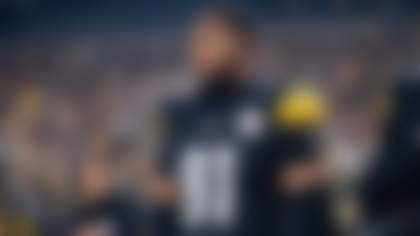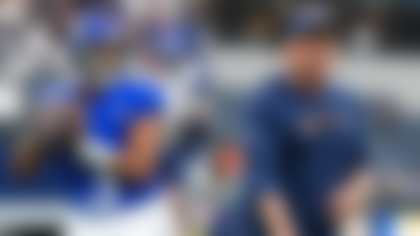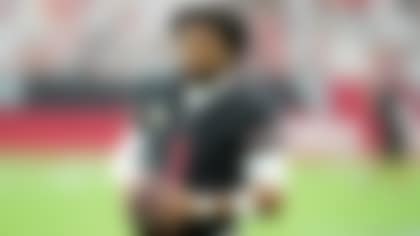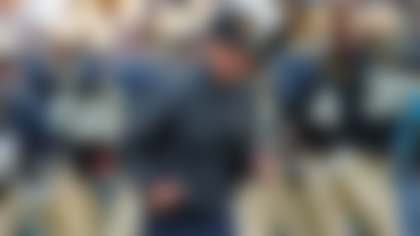Part of the frustration for the New York Giants with this latest Plaxico Burress fiasco is the idea among them that Burress was showing signs of calming down. With all they had already trudged through with this problematic receiver, he finally appeared to be getting things right.
In recent weeks he was being responsible in fulfilling his meeting, workout and treatment schedules. That, alone, had been a primary source of consternation, the nexus this season of his assorted suspensions and fines.
Burress timeline since Super Bowl XLII
</center>
Feb. 3: Made 13-yard winning touchdown reception in Super Bowl XLII.
June 12: Fined $25,000 for refusing to practice at mandatory minicamp.
Aug. 19: Wife called police over domestic dispute; granted temporary restraining order.
Sept. 4: Signed a five-year, $35 million contract.
Oct. 5: Suspended two weeks, one game (vs. Seattle) and fined $117,500 for missing a team meeting.
Oct. 19: Fined $45,000 for verbally abusing a referee and throwing a ball into stands.
Oct. 26: Benched for first quarter vs. the Steelers after missing a mandatory treatment session.
Nov. 28: Accidentally shot himself in right thigh at a New York nightclub.
Nov. 29: Is treated at New York-Presbyterian Hospital/Weill Cornell Medical Center and discharged.
Dec. 1: Posts $100,000 bail on weapons possession charges.
Oh, Burress could still give you that scowl or faraway look of disinterest and disenchantment. But the football stuff? Burress, finally, appeared to be coming on board.
And then last Friday night he took a spin on shooting himself in the foot -- something he has long perfected. This time, he literally shot himself in the leg. In a Manhattan night club. Giants linebacker Antonio Pierce was with him. An apparent cover-up by both ensued. And now a weapons possession charge could earn Burress, at worst, three-plus years in prison; at least, heavy sanctions from the league. Pierce, too, is not yet set free from his involvement.
Giants players and management view Burress as a person who lets few people close to him. They see a 31-year-old man-child whose mother died six years ago, whose father long has not been a part of his life, a person with recent domestic disputes in his current home, a person who from early youth forward learned to believe that he was the final authority. He has treated the Giants that way. He has treated his teammates that way.
Now in dealing with the legal system, with strict New York gun laws and penalties, Burress confronts a sweeping, impacting authority larger than him. This is new for him. This is real and he knows it.
Burress has always taken the approach that conforming to authority means you are "soft." He has not accepted in the past that some of it simply means being professional. Being prompt has occasionally not been important to him. Burress has always wanted respect for himself. But he has failed to respect the game, several of his teammates say. His nonchalant, whatever attitude is part of his protection. He is good at the cold shoulder. And when people have a negative impression of him, the idea of winning them over? Not interested.
The Giants find themselves in a perplexing, tricky situation.
They have invested much in his development. Is this the bottom for him? Does he begin to rise now? Does he deserve a chance to stay a Giant and come out of this a better human being? Do they cut him and go after the money? They must ask themselves this question: Does he actually need us more than we need him? If we suddenly divorce, will this player personally collapse? There is a strong belief among those closest to him with the Giants that Burress has a problem with alcohol. There is the sense that he needs several layers of therapy. That he must have that, regardless, immediately.
So, the Giants could give Burress maximum fines and game suspensions as the legal process unfolds. They could bring him back and simply deactivate him until he shows he is ready to jump fully aboard. They could simply place him on the non-football-illness list and say see you next season and we will revisit where we are then. They could let this all play out, give him another chance with the idea that the penalty for further infraction will be, simply, cutting him.
These are things the Giants have been discussing since the Burress gun incident broke.
Multiple sources within the team said a decision will be made and the result in place before players report to practice on Wednesday.
Burress, 6-foot-5, 232 pounds, has a skill set unlike any other Giants receiver. In some ways, it is unlike any other NFL receiver. His routine draw of double-coverage means the Giants scheme with their other 10 offensive players battling the rest of a defense's nine, since a safety and cornerback on nearly every play track Burress.
Burress, thus, not only opens others' passing lanes, but he also impacts the Giants' big-play running game. He loosens defenses, backs them off, making the point of attack in the run game more manageable.
The Giants believe they would not have won the last Super Bowl without him. They think they can win the next one without him. They believe they certainly have a better shot of winning it all again with him. Burress changes games. Especially postseason games.
One of Burress' teammates said, requesting anonymity: "Plaxico will look back one day and wish he could change some things, done some things differently. The game helps create and mold you, if you pay attention. He really needs us now. We have always needed him. It comes down to one thing he has to learn in all of this, across the board -- respect."



